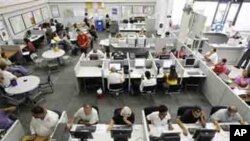Hundreds of thousands of Americans will see their federal unemployment benefits expire this week, and millions more by the end of the year, unless Congress acts to extend them.
The payments are designed to provide the jobless with just enough temporary income to cover basic needs while they look for work. Congress has repeatedly prolonged the duration of those payments amid high U.S. unemployment but another extension is far from assured.
More than a year into a weak economic recovery, the unemployment rate continues to hover near 10 percent. Millions of Americans have been without work for a year or more, taking a severe financial - and often emotional - blow.
In Pennsylvania, unemployed sales manager Gregg Rosen has cut back on everything from food to medication, and can no longer help support his disabled mother.
"That devastates me," he said.
Many idled workers are frustrated.
"I've been out looking for work every day, and I'm just not getting anywhere," said one unemployed worker in Rhode Island.
President Barack Obama has consistently pressed Congress to extend federal benefits for the unemployed. "We've got a responsibility to help them make ends meet and support their families even as they are looking for another job," he said.
But Capitol Hill is bracing for a repeat of the last extension battle in July, when Republicans objected to further benefits unless other federal spending was cut by an equal amount.
"The bill before us today is the ninth extension of unemployment benefits since mid-2008," said Rep. Charles Boustany, a Louisiana Republican. "And with the exception of just one bill last November, every one of those extensions was not paid for. That's a total of $135 billion added to our $14 trillion debt."
Analysts note that unemployment benefits are meant to be temporary, but the severity of the recession and the slow pace of the economic recovery have led many Americans to rely on the program for a prolonged period.
"People say 'You do not want to discourage people from looking for work by giving them too generous an income replacement,'" says Eric Toder, an economist and former U.S. Treasury official. "I think the feeling is now that there isn't 10 percent unemployment because people aren't looking for work. There is high unemployment because there aren't jobs."
Toder adds that the unemployed usually spend all the benefits they receive, providing stimulus to the economy as a whole.
Extending unemployment benefits is but one of many items Democrats hope to achieve in a brief end-of-year congressional session. Passage is considered likely in the House of Representatives, but questionable in the Senate, where Republicans can use procedural motions to block legislation.
Some jobless workers have mounted protests in the past to press for an extension of benefits, and say they stand ready to do so again - even at a cost to their pride.
"You know I'm not used to this," said one unemployed woman who was among the protesters. "I don't want to be begging people."
Most economists expect the unemployment rate to remain above nine percent for months to come.




